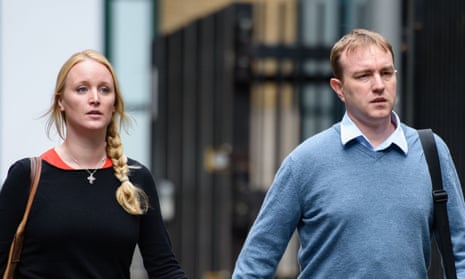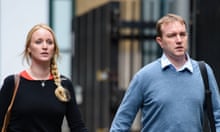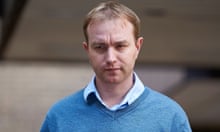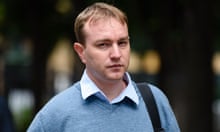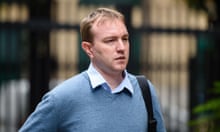Former City trader Tom Hayes has been sentenced to 14 years in jail after becoming the first person to be convicted by a jury of rigging the Libor interest rate.
Hayes, 35, a former UBS and Citigroup yen derivatives trader, was convicted of eight counts of conspiracy to defraud.
Sentencing him at London’s Southwark crown court, Mr Justice Cooke said: “The conduct involved here is to be marked out as dishonest and wrong and a message sent to the world of banking accordingly. The reputation of Libor is important to the city as a financial sector and the banking institutions of the City.
“Probity and honesty is essential as is trust. The Libor activity of which you played a leading part put all that in jeopardy.”
When the judge announced his sentence, Hayes – dressed in a light blue shirt and dark blue jumper with black slacks – put his head in his hands and ran his hands through his hair. During the reading of the judgement he shook his head repeatedly.
Hayes was sentenced to nine-and-a-half years for each of the first four offences to run concurrently and four-and-a-half years for each of the second four. These will run consecutively to total 14 years.
Hayes, from Fleet, Hampshire, was accused of being the ringleader in a vast conspiracy to fix the London interbank offered rate (Libor) between 2006 and 2010. As well as being a vital measure for banks, Libor was used as a benchmark to price a wide range of financial products. An estimated $300tn (£192tn) of contracts are based on Libor, setting borrowing rates for businesses and consumers from Sydney to New York and London.
Motivated by greed and a desire for higher pay, the court heard that Hayes set up a network of brokers and traders that spanned 10 of the world’s most powerful financial institutions, cajoling and at times bribing them to help rig rates – designed to reflect the cost of interbank borrowing – for profit. Hayes would then place large bets on financial markets that were sensitive to Libor moves.
The former trader, who was diagnosed with mild Asperger syndrome just before his trial began, said he was transparent about trying to influence rates and his managers were aware.
But a jury of seven men and five women rejected his defence and found him guilty on all eight counts.
The case was seen as a big test for the Serious Fraud Office and its effectiveness in policing banking fraud. In a statement after the trial, the SFO said: “The jury were sure that in his admitted manipulation of Libor, Hayes was indeed dishonest. The verdicts underline the point that bankers are subject to the same standards of honesty as the rest of us. This brings to an end one strand of the SFO’s continuing Libor investigation. Another 12 individuals await their trial of which one has pleaded guilty.”
Hayes claimed he was taking part in an “industry-wide” practice. He described the broking market he worked in as the wild west, a place with no rules and where relationships relied on lavish entertainment. He said it was this high-pressure environment which took its toll on him, prompting him to threaten brokers and pick fights with colleagues to move interest rates to aid his trading.
However, Justice Cooke said the essence of Hayes’s defence had been that the type of activity the accused had been involved in was commonplace.
“The fact that others were doing the same as you is no excuse,” the judge said.
Defence counsel Neil Hawes QC had argued before the sentencing that there were people who were more senior to Hayes who had been aware of the activities. He said that Hayes had become the primary carer for his son and the information he provided to the Serious Fraud Office (SFO) had “accelerated” their knowledge.
However, the judge said there was little by way of mitigation and that Hayes would serve half of his sentence in custody before being released on licence.
Hayes is the first person to stand trial for alleged manipulation of Libor. He was arrested in December 2012 and questioned by the Serious Fraud Office. He told SFO investigators that his trades had earned £150m for UBS in a three year period.
He said he originally confessed to misconduct in 2013 after being “frozen with fear” that he would be extradited to America. He said he did not believe he had acted dishonestly with regard to Libor and that he wanted to do his job “as perfectly” as he could.
US prosecutors wanted to charge Hayes on three counts of conspiracy to fraud, with each one carrying a 20 to 30-year sentence.
He subsequently withdrew from a co-operation agreement with the SFO and in December 2013 pleaded not guilty.
